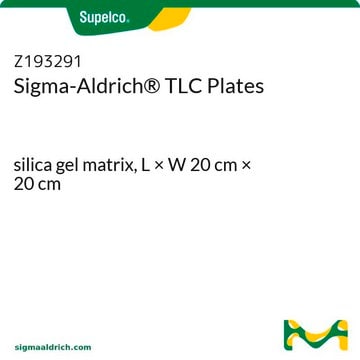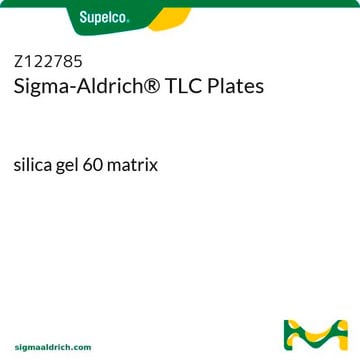推荐产品
材料
aluminum support
silica gel 60 matrix
特點
binder Polymeric
fluorescent indicator: no
製造商/商標名
Sigma-Aldrich
技術
thin layer chromatography (TLC): suitable
長度 × 寬度
20 cm × 20 cm
層厚度
200 μm
表面積
~500 m2/g
粒徑
8.0-12.0 μm
孔徑
0.75 mL/g pore volume
60 Å mean pore size
正在寻找类似产品? 访问 产品对比指南
一般說明
Silica gel is a rigid 3D network of colloidal silica. It is exclusively used as a support material for the active titanium(III) centers in Ziegler-Natta catalysts. Silica gel allows a controlled fragmentation lresulting in the formation of uniform polymer particles with narrow particle size distribution and high bulk density. Silica gel is widely used as layer material for TLC. Plaster of Paris is generally used as binding agent to hold silica gel firmly to the TLC plates. Silica gel is used as sorbent which is applied to aluminium foils.
- Outstanding wettability (even for 100% aqueous visualisation reagents)
- Easy and precise cutting (no flaking of silica)
- Excellent separation efficiency and reproducibility from batch to batch
應用
Silica gel on TLC Alu foils may be used to perform thin layer chromatography.
其他說明
this product will be discontinued, please find the alternative product here :
105553
105553
儲存類別代碼
13 - Non Combustible Solids
水污染物質分類(WGK)
WGK 3
閃點(°F)
Not applicable
閃點(°C)
Not applicable
Joseph C. Touchstone
Practice of Thin Layer Chromatography (1992)
Srishti Dar et al.
Nature protocols, 12(2), 390-400 (2017-01-27)
The process of membrane fission is fundamental to diverse cellular processes such as nutrient uptake, synaptic transmission and organelle biogenesis, and it involves the localized application of curvature stress to a tubular membrane intermediate, forcing it to undergo scission. Alternative
A simple method for production of pure silica from rice hull ash
Kalapathy, U., A. Proctor, and J. Shultz.
Bioresource Technology, 73, 257-262 (2000)
Silica gel supported zirconocene dichloride/methylalumoxane catalysts for ethylene polymerization: Effects of heterogenation on activity, polymer microstructure and product morphology.
Janiak, Christoph, and Bernhard Rieger.
Angew. Makromol. Chem., 215, 47-57 (1994)
我们的科学家团队拥有各种研究领域经验,包括生命科学、材料科学、化学合成、色谱、分析及许多其他领域.
联系技术服务部门



![N-[3-(2-呋喃基)丙烯酰基]-亮氨酸-甘氨酸-脯氨酸-丙氨酸](/deepweb/assets/sigmaaldrich/product/structures/805/876/96b5fb57-71c8-4c6b-b5d2-fafe7374cd85/640/96b5fb57-71c8-4c6b-b5d2-fafe7374cd85.png)

